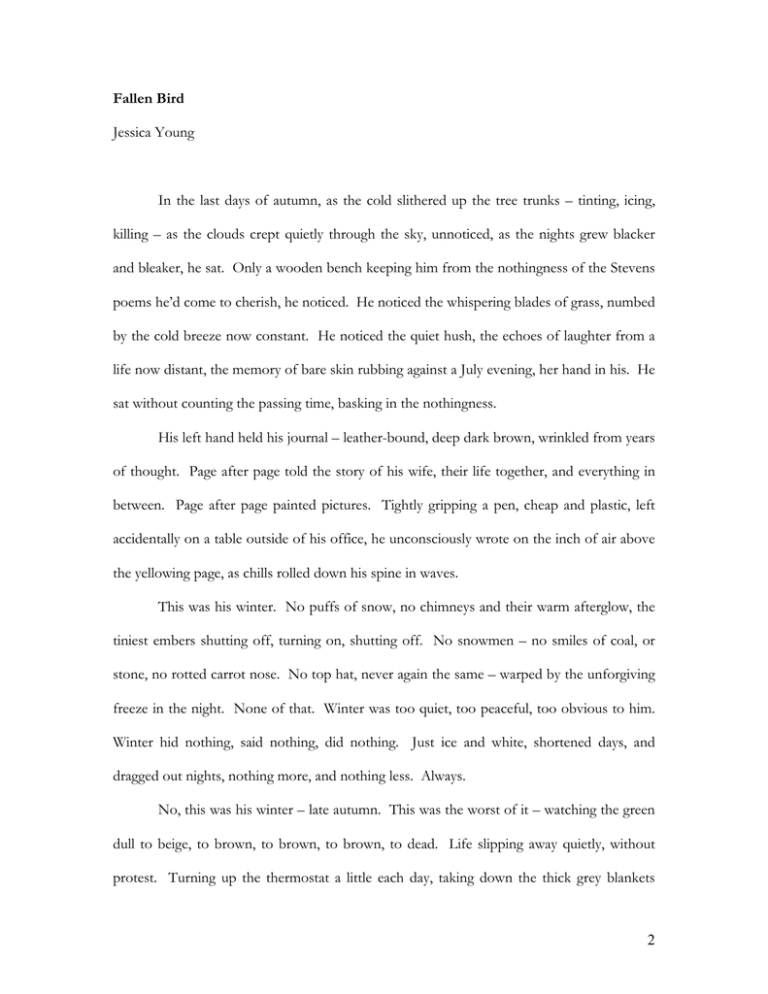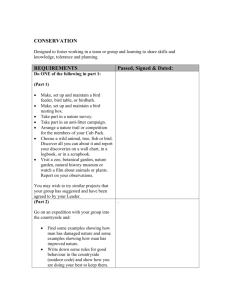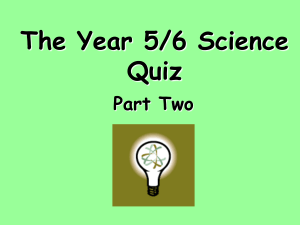Fallen Bird Jessica Young
advertisement

Fallen Bird Jessica Young In the last days of autumn, as the cold slithered up the tree trunks – tinting, icing, killing – as the clouds crept quietly through the sky, unnoticed, as the nights grew blacker and bleaker, he sat. Only a wooden bench keeping him from the nothingness of the Stevens poems he’d come to cherish, he noticed. He noticed the whispering blades of grass, numbed by the cold breeze now constant. He noticed the quiet hush, the echoes of laughter from a life now distant, the memory of bare skin rubbing against a July evening, her hand in his. He sat without counting the passing time, basking in the nothingness. His left hand held his journal – leather-bound, deep dark brown, wrinkled from years of thought. Page after page told the story of his wife, their life together, and everything in between. Page after page painted pictures. Tightly gripping a pen, cheap and plastic, left accidentally on a table outside of his office, he unconsciously wrote on the inch of air above the yellowing page, as chills rolled down his spine in waves. This was his winter. No puffs of snow, no chimneys and their warm afterglow, the tiniest embers shutting off, turning on, shutting off. No snowmen – no smiles of coal, or stone, no rotted carrot nose. No top hat, never again the same – warped by the unforgiving freeze in the night. None of that. Winter was too quiet, too peaceful, too obvious to him. Winter hid nothing, said nothing, did nothing. Just ice and white, shortened days, and dragged out nights, nothing more, and nothing less. Always. No, this was his winter – late autumn. This was the worst of it – watching the green dull to beige, to brown, to brown, to brown, to dead. Life slipping away quietly, without protest. Turning up the thermostat a little each day, taking down the thick grey blankets 2 from the top shelf of the closet, taking out the screens, putting in the storm windows, cursing all the cracks in the floors, the numbers on the heating bill. This was when his bones ached, when his mind woke up somewhere else, spinning. This was when his house sounded its most empty, devoid, deserted. And this was when a bird dropped from the sky. It was a small, ordinary bird – brown feathers now eerily still. And then the wind swirled around it, trying to twirl it back up into the sky. Too heavy, the bird sat there. And the man, unmoving, watched it – his eyebrows scrunching in, the solemnity straightening his lips. For perhaps the first time in his life since his wife’s all too sudden death, he was unable to attach words to what he had just seen... not sure it was all real, unable to pinpoint what it made him feel. There was no good way to put it – no metaphor, no imagery. The bird fell from the sky the way birds fall from the sky. Only the man had never before seen a bird fall from the sky, never before heard something that was breathing one second, thunk the next. Like a bass drum. The sound filled his head, playing again, and again. He was affected by the sight of it, and couldn’t look away. It had been an ordinary morning, an ordinary day – the town streets had been packed with business and children and holiday cheer, as they always seemed to be, and as he always did, he had walked down the darker streets – leaning against the shadows of buildings every few blocks to stop his mind from spinning. But now his mind was focused. And he wished, maybe prayed, that he were sleeping and would soon wake. So he sat there for hours, and he stared at the bird. He watched the colors of sunset roll over it, watched the wind try to carry it away time after time after time, unsuccessful, silent. He remembered his wife at their kitchen table, elbows up, hair down. The sound of her smile – her lips arcing just enough to be audible. He thought of her mming while 3 crunching on cereal, unaware. He had loved to watch, to stare, to observe. Now wished he had done it more often. Done it closer. Done it better. He didn’t have much to look back on, and worried he might forget her. Might not remember to remember. Without realizing it, he sat on the ground, closer to the bird, and looked around. The town lights in the distance were no competition for the stars… no competition for the show far above his head – the twists of constellations, sprinkles of asterisms. Asterisms. His wife had loved astronomy – loved the idea of vastness, knowing that she could never fully grasp it. He remembered wanting to get lost in it with her – the nights spent with their backs to the earth, their eyes upward, their thermoses of soup. Her soup. Her greatgrandmother’s recipe. Perfect every time. And then he woke up. It had rained. Drenched. Soaked. The water pried his eyes open, poured itself in. The stars were gone. And he turned, looked at the bird, and noticed it had taken on a black color, the way her hair always had after a bath. A small, pathetic thing it had become while he slept. Its feathers stuck together – tear-shaped drops of rain sliding on their greasiness. He picked it up, slowly; it fit easily in the palm of his hand, and felt lighter than he imagined a bird can. And he put it back down, on a piece of still-green ground underneath the even darker darkness of the wooden bench. He walked home, humming an old tune. And the bird, silent and tiny, remained under the bench for weeks – getting smaller and smaller, duller and duller, until one day it disappeared under the whiteness of winter. And the man put away his journal. And he took down the old photos, with their corners gracefully bent in over the years, their faded print on back. Their first vacation together – the white beaches of Thailand, and how they had laughed endlessly at the 4 foreignness of the American Breakfast. Him at the piano, the cat curled in his lap. Her on the front steps, arms stretched out impossibly far, inviting. And he stored it all in boxes, along with his ring, and all of the other things that reminded him of her. He packed up all of his books, papers, work – packed it all into bigger boxes and bigger bags and cases, which he packed in a van, which he drove until he could recognize nothing, and then drove some more. And he found a small house, unlived in, wanting to be lived in, desperate to be lived in, and he knocked on the door. 5 MIT OpenCourseWare http://ocw.mit.edu ES.292 Writing Workshop Spring 2008 For information about citing these materials or our Terms of Use, visit: http://ocw.mit.edu/terms.


